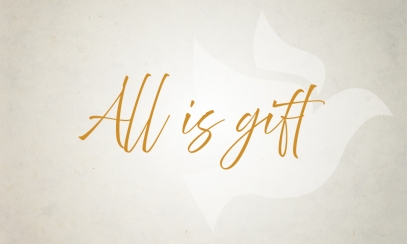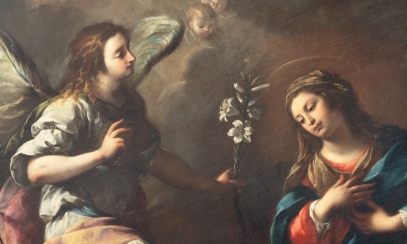
Encounter Christ Through the Holy Words of the Mass
Words! The Mass is full of words. It is easy to get lost in or, worse, to ignore all those words. Yet St. John, at the beginning of his Gospel, wrote: “In the beginning was the Word, and the Word was with God, and the Word was God … And the Word became flesh and made his dwelling among us.” Jesus is THE WORD of God.
Words! The Mass is full of words. It is easy to get lost in or, worse, to ignore all those words. Yet St. John, at the beginning of his Gospel, wrote: “In the beginning was the Word, and the Word was with God, and the Word was God … And the Word became flesh and made his dwelling among us.” Jesus is THE WORD of God.
So, when we hear words being read to us at Mass, words from the Old Testament and the New Testament, they really are all words about the one Word, Jesus himself. There are many other words used at Mass. In fact, many of them have scriptural roots and connections. But for now, let us focus on those readings we hear every Sunday.
Those words have power. Think of it this way: In the beginning of the Book of Genesis we read: “Then God said: Let there be light, and there was light.” God spoke a word and it was effective. So, too, with his very Son, the eternal Word spoken by the Father. In fact, any words spoken by the Father really were all about the eternal Word, the Son of God. The Father has never spoken a word which was not his Son.
When we hear the readings at Mass, our ears need to hear all those words as about the Son of God, just as they were intended to be heard. Those words have a power which seeks to change our lives. We must train our ears to hear and the ears of our hearts to be grasped by those words, by that one Word, Jesus. Jesus stood up one day in his home synagogue and read from the prophet Isaiah and concluded with: “Today this scripture passage is fulfilled in your hearing.” (Lk 4:21) We continue the synagogue practice of reading from the Scriptures.
Except for the Sundays after Easter, at every Sunday Mass our first reading is from the Old Testament, readings which Jesus would have heard.
Even these testify to Jesus himself as he once told his opponents: “You search the scriptures because you think you have eternal life through them; even they testify on my behalf.” (Jn 5:39) I know that sometimes this might be difficult to discern, but let us take Jesus at his word. As we hear these ancient readings, let us hear the voice of the Father speaking about his Son. The Church has chosen the specific first reading to complement the Gospel reading for the day. On Easter Sundays, our first reading is from the Acts of the Apostles and the Gospel is from St. John.
Our second reading every Sunday is from the Letters of the New Testament, plus readings from Hebrews and the Book of Revelation. These might seem simply to talk about Jesus and the life we are to lead in following Jesus, but they really mean to have us become Christ in our own day and age. These readings often have little to do with the theme of the Gospel or the first reading, but they do show us how we are to “put on” Christ.
Finally, the Gospels are divided into a three-year cycle: A (Gospel of Matthew), B (Gospel of Mark and many selections from the Gospel of John) and C (Gospel of Luke, which we are hearing this year, 2022). So, each year we follow the ministry, life, death and resurrection of the Lord.
At the end of the readings, the lector proclaims, “The Word of the Lord.” We respond, “Thanks be to God.” May we encounter Christ every Sunday through these holy words.



